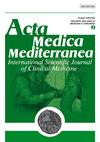Can Syndecan-1 Be Used As A Biomarker In Alzheimer’s Disease?
IF 0.3
4区 医学
Q4 Medicine
引用次数: 0
Abstract
Background: Syndecan-1 (SDC-1) is a member of the syndecan family, which includes heparan sulfate proteoglycans. SDC-1 is important for cell-cell and cell-matrix interactions. The aim of this study is to examine the relationship between serum SDC-1 levels and mild cognitive impairment (MCI) and Alzheimer’s disease (AD).Methods: Eighty-two patients aged 65 years and over were included in the study. The Mini-Mental State Examination (MMSE) was used to evaluate the cognitive functions of the patients. Comprehensive geriatric assessment components were administered to the patients. Serum SDC-1 levels were measured with an enzyme-linked immunosorbent assay kit.Results: When patients were grouped as control, MCI and AD, significant decreases were observed in Katz daily living activity (p<0.001), Lawton instrumental daily living activity (p=0.001), Mini-nutritional assessment (p=0.001), MMSE (p=0.001) scores. SDC-1 level was 154.88±22.85 in the control group, 157.95±19.45 in the MCI group, and 159.54±14.04 ng/mL in the AD group, and no significant correlation was observed (p=0.677). When correlation analyzes were performed with SDC-1, a negative correlation was found with the Yesavage geriatric depression scale score (Spearman rho: -0.223 p=0.044). Conclusion: No correlation was found between SDC-1 level and AD, and it showed a negative correlation with depression. Clarifying the pathogenetic processes more clearly will guide the development of new treatment strategies.Syndecan-1可以作为阿尔茨海默病的生物标志物吗?
背景:syndecan -1 (SDC-1)是syndecan家族的一员,该家族包括硫酸肝素蛋白多糖。SDC-1对细胞-细胞和细胞-基质相互作用很重要。本研究旨在探讨血清SDC-1水平与轻度认知障碍(MCI)和阿尔茨海默病(AD)之间的关系。方法:纳入82例65岁及以上患者。采用简易精神状态检查(MMSE)评估患者的认知功能。对患者进行综合老年评估。采用酶联免疫吸附测定试剂盒检测血清SDC-1水平。结果:将患者分为对照组、MCI组和AD组时,Katz日常生活活动(p<0.001)、Lawton仪器日常生活活动(p=0.001)、mini -营养评估(p=0.001)、MMSE (p=0.001)评分均显著降低。对照组的SDC-1水平为154.88±22.85,MCI组为157.95±19.45,AD组为159.54±14.04 ng/mL,两者无显著相关性(p=0.677)。当与SDC-1进行相关分析时,发现SDC-1与Yesavage老年抑郁量表评分呈负相关(Spearman ρ: -0.223 p=0.044)。结论:SDC-1水平与AD无相关性,与抑郁呈负相关。更清楚地阐明发病过程将指导新的治疗策略的发展。
本文章由计算机程序翻译,如有差异,请以英文原文为准。
求助全文
约1分钟内获得全文
求助全文
来源期刊

Acta Medica Mediterranea
医学-医学:内科
自引率
0.00%
发文量
0
审稿时长
6-12 weeks
期刊介绍:
Acta Medica Mediterranea is an indipendent, international, English-language, peer-reviewed journal, online and open-access, designed for internists and phisicians.
The journal publishes a variety of manuscript types, including review articles, original research, case reports and letters to the editor.
 求助内容:
求助内容: 应助结果提醒方式:
应助结果提醒方式:


